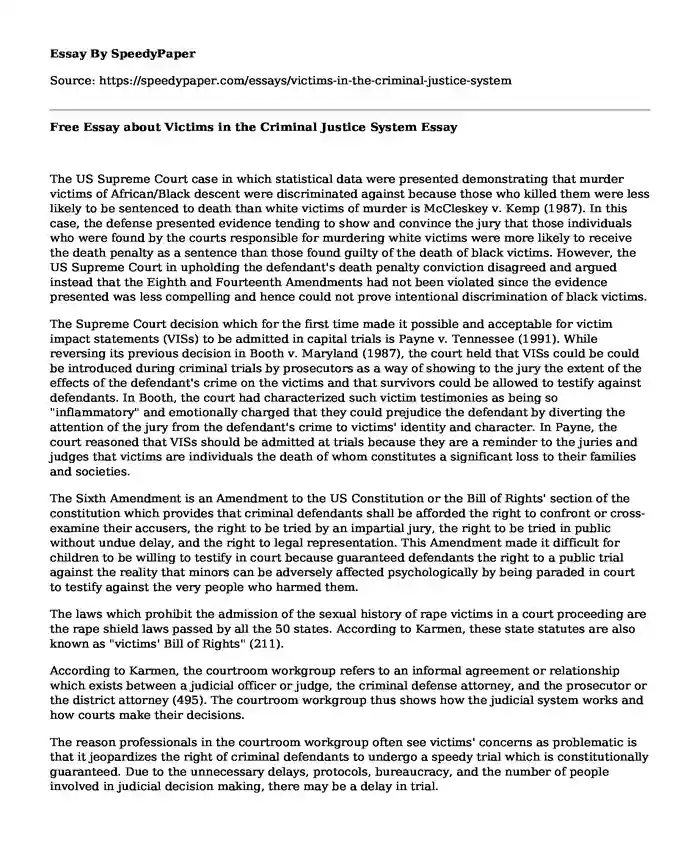
| Type of paper: | Essay |
| Categories: | Criminal justice |
| Pages: | 3 |
| Wordcount: | 774 words |
The US Supreme Court case in which statistical data were presented demonstrating that murder victims of African/Black descent were discriminated against because those who killed them were less likely to be sentenced to death than white victims of murder is McCleskey v. Kemp (1987). In this case, the defense presented evidence tending to show and convince the jury that those individuals who were found by the courts responsible for murdering white victims were more likely to receive the death penalty as a sentence than those found guilty of the death of black victims. However, the US Supreme Court in upholding the defendant's death penalty conviction disagreed and argued instead that the Eighth and Fourteenth Amendments had not been violated since the evidence presented was less compelling and hence could not prove intentional discrimination of black victims.
The Supreme Court decision which for the first time made it possible and acceptable for victim impact statements (VISs) to be admitted in capital trials is Payne v. Tennessee (1991). While reversing its previous decision in Booth v. Maryland (1987), the court held that VISs could be could be introduced during criminal trials by prosecutors as a way of showing to the jury the extent of the effects of the defendant's crime on the victims and that survivors could be allowed to testify against defendants. In Booth, the court had characterized such victim testimonies as being so "inflammatory" and emotionally charged that they could prejudice the defendant by diverting the attention of the jury from the defendant's crime to victims' identity and character. In Payne, the court reasoned that VISs should be admitted at trials because they are a reminder to the juries and judges that victims are individuals the death of whom constitutes a significant loss to their families and societies.
The Sixth Amendment is an Amendment to the US Constitution or the Bill of Rights' section of the constitution which provides that criminal defendants shall be afforded the right to confront or cross-examine their accusers, the right to be tried by an impartial jury, the right to be tried in public without undue delay, and the right to legal representation. This Amendment made it difficult for children to be willing to testify in court because guaranteed defendants the right to a public trial against the reality that minors can be adversely affected psychologically by being paraded in court to testify against the very people who harmed them.
The laws which prohibit the admission of the sexual history of rape victims in a court proceeding are the rape shield laws passed by all the 50 states. According to Karmen, these state statutes are also known as "victims' Bill of Rights" (211).
According to Karmen, the courtroom workgroup refers to an informal agreement or relationship which exists between a judicial officer or judge, the criminal defense attorney, and the prosecutor or the district attorney (495). The courtroom workgroup thus shows how the judicial system works and how courts make their decisions.
The reason professionals in the courtroom workgroup often see victims' concerns as problematic is that it jeopardizes the right of criminal defendants to undergo a speedy trial which is constitutionally guaranteed. Due to the unnecessary delays, protocols, bureaucracy, and the number of people involved in judicial decision making, there may be a delay in trial.
The main reason why people are often too quick and anxious to blame victims for their own plight or victimization is the feeling that some victims expose themselves to or are responsible for their victimization (Karmen 138). Further, some of the theological, philosophical, and psychological appeals or beliefs which facilitate the victim blaming culture include retribution, personal responsibility, just world beliefs, and the karma belief.
Based upon the story in the NPR report, the victims' rights laws conflict with the rights of defendants in that while on the one hand the victims' rights laws seek to give the victims of crime the opportunity to be heard, considered, and protected in the criminal justice system, the rights of defendants are aimed at protecting defendant from unfair treatment and trial. The rights which are afforded to victims include the right to compensation by offenders, the right to be protected from defendants, the right to restitution, the right to be heard in criminal justice proceedings, and the right to be represented. The victims who are most likely to have their wishes represented and their victim impact statements heard are often those who come from well off or recognized families while those who might not be as well represented are those from poor backgrounds and racial minority communities.
Work Cited
Karmen, Andrew. Crime Victims: An Introduction to Victimology, Ninth Edition. CengageLearning, 2015
Cite this page
Free Essay about Victims in the Criminal Justice System. (2022, Jun 23). Retrieved from https://speedypaper.com/essays/victims-in-the-criminal-justice-system
Request Removal
If you are the original author of this essay and no longer wish to have it published on the SpeedyPaper website, please click below to request its removal:
- Free Essay on Project Management Competencies
- The Motown Effect Essay, Free Example for Students
- Leader Profile Essay Sample
- Free Essay Sample on Workplace Mobbing
- Free Essay: Blindness Flaws and Knowledge of Truth in Oedipus Rex
- Free Essay Discussing Causes and Effects of Internet Addiction
- Free Essay Sample: Bioenergy and Its Environmental Properties
Popular categories




